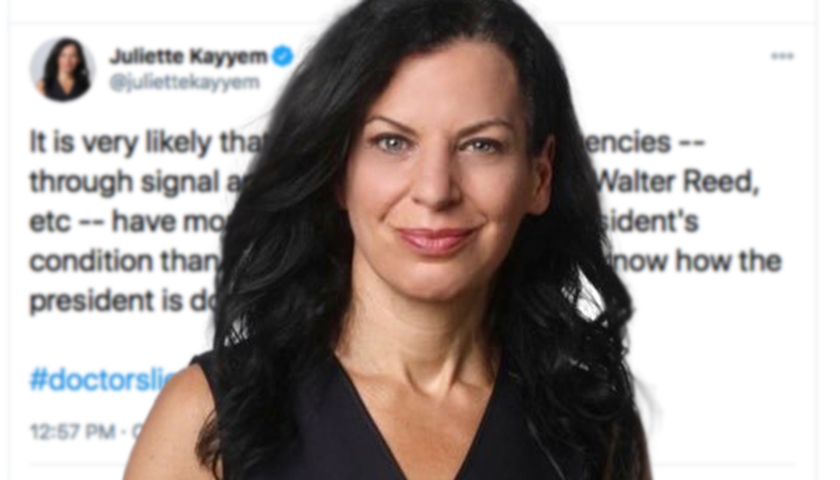by Ben Zeisloft
Harvard University professor and CNN analyst Juliette Kayyem alleged that it is “very likely” that Russian spies infiltrated Walter Reed National Military Medical Center and gained access to information about President Donald Trump’s medical condition.
President Donald Trump and First Lady Melania Trump tested positive for COVID-19 on Thursday. The president experienced symptoms before moving to Walter Reed Hospital in Bethesda, Maryland, out of an “abundance of caution” the following day.
Kayyem, a senior lecturer in international security at Harvard’s Kennedy School of Government, speculated that Russian intelligence had infiltrated Walter Reed and had more information about the president’s condition than the American public.
“It is very likely that Russian intelligence agencies — through signal and human intel sources at Walter Reed, etc — have more information about the President’s condition than we do,” said Kayyem.
The tweet came amid criticism that the White House was not transparent about Trump’s condition and the timeline in which it happened.
Although Kayyem shared the hashtag #DoctorsLieToo, she has been highly supportive of science in other circumstances, particularly with regard to social distancing and mask-wearing.
Social media users began mocking Kayyem for pushing this highly speculative viewpoint that Russian spies infiltrated Walter Reed Hospital.
Kayem later doubled down, responding to one prominent Twitter conservative.
“Yep. What part of this don’t you believe: that Trump team is lax on security and vulnerable or that Russia isn’t interested in Trumps [sic] health leading to election [sic] they are interfering in. Keep doing what you are doing. It’s working so well for America and the hospitalized Trump,” she replied.
James Carafano, a Heritage Foundation fellow and an expert in national security, explained to Campus Reform that determining President Trump’s medical condition would be a poor use of resources for the Russians.
“The Russians are not ten feet tall,” he said. “The notion that Trump gets rushed to Walter Reed and the Russians put together some kind of sophisticated intelligence operation is probably close to zero… The notion that they can just throw something together doesn’t pass the laugh test.”
If Kayyem is implying this type of surveillance by her tweet, Carafano says that such quick action by the Russians is “unrealistic.”
“I would imagine, actually, the Russians probably are doing the same thing we’re doing, which is reading what the doctors are saying,” said Carafano. “The notion that you would cultivate a unit resource on twenty-four hours’ notice is nuts. The capabilities the Russians have are classified, so if this professor has any knowledge whatsoever of what Russia’s syncing capabilities are, that’s really interesting.”
Although it is “not unthinkable” that the Russians could create a longstanding surveillance capability at Walter Reed, Carafano sees this as rather unlikely.
Since the United States is “very transparent about the medical condition of our public officials, particularly the President,” Carafano likewise says that establishing surveillance capabilities at Walter Reed “doesn’t actually seem incredibly logical.”
Campus Reform has reached out to Kayyem and will update this article accordingly.
– – –
Benjamin Zeisloft is a Pennsylvania Senior Campus Correspondent, reporting on liberal bias and abuse for Campus Reform. He is studying Finance and Marketing at the Wharton School of the University of Pennsylvania. Benjamin also writes for The UPenn Statesman and the Wharton International Business Review.
Photo “Juliette Kayyem” by Juliette Kayyem Twitter. Background Photo “Kayyem Tweet” by Juliette Kayyem Twitter.




